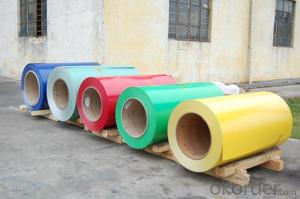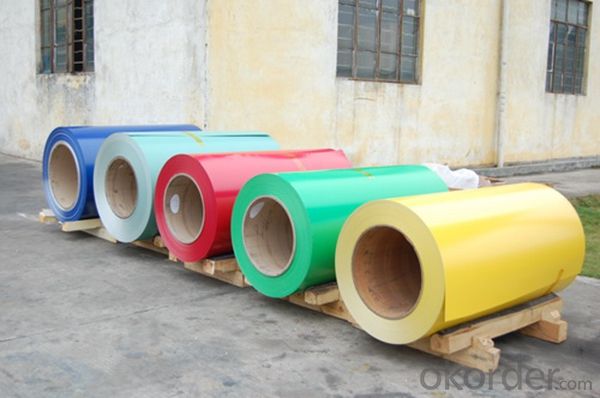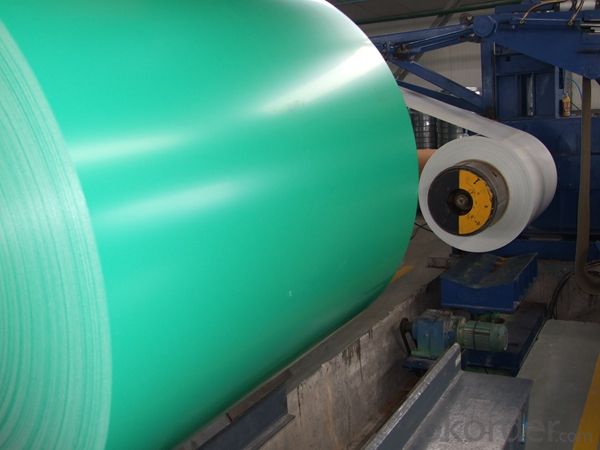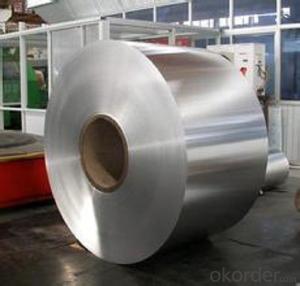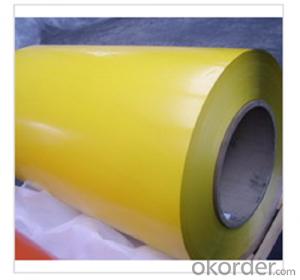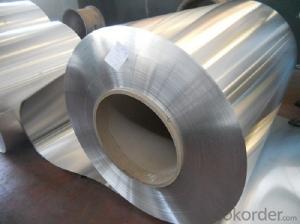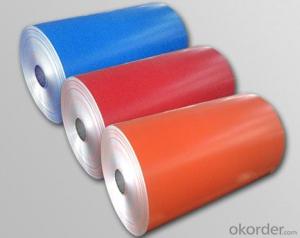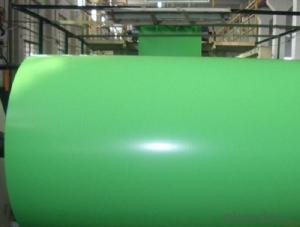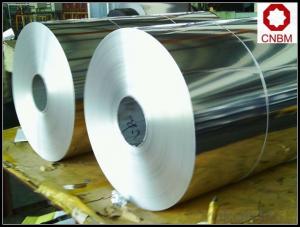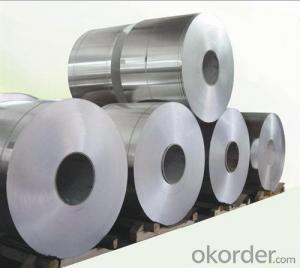2x.040 Aluminum Coil Stock for Color Coating Aluminum Coil for Building
- Loading Port:
- Shanghai
- Payment Terms:
- TT OR LC
- Min Order Qty:
- 5 m.t.
- Supply Capability:
- 10000 m.t./month
OKorder Service Pledge
OKorder Financial Service
You Might Also Like
Specification
1. Specification of Color Coating Aluminum Coil for Building
Name | 3003 Aluminum Coil |
Brand | PinRui |
Alloy | 1100H-18, 3003-H24,3003-H26,3005-H26,8011,3004,3105,5005,etc. |
Thickness | 0.1~1.5mm |
Width | <2000mm< span=""> |
MOQ | 1 MT |
Coating finish | Brushed, drawing, embossed, printing |
Color | As to code RAL |
Surface | Embossed,Mill Finish,Coated,Brushed |
Gloss | 10-90%(EN ISO-2813:1994) |
Total coating thick | PVDF27 ~35micron |
Polyester18~27micron(EN ISO-2360:1995) | |
Coating hardness | 2H |
Adhesion | 5B (EN ISO-2409:1994) |
Impact resistance | No cracking and peeling (A.S.T.M D2794-1993) |
Flexibility (T-bend) | 0T- 2T |
MEK resistance | 100 |
Certification | ISO9001:2000, CE, SGS |
Coil's standard diameter | 1100mm |
Inner Diameter | 405mm/505mm |
Coil's standard weight | 1MT - 2MT |
2. Application of Color Coating Aluminum Coil for Building
(1).Interior: wall cladding, ceilings, bathrooms, kitchens and balconies, shutters, doors...
(2).Exterior: wall cladding, facades, roofing, canopies, tunnels,column covers , renovations...
(3).Advertisement: display platforms, signboards, fascia, shop fronts...
3. Feature of Color Coating Aluminum Coil for Building
*Such coil is specially designed to replace aluminum ingot, due to the high export tax of aluminum ingot, the coil has better price than ingot.
*This type of coil can fit customer's remelting furnace just like ingot, no need to make any change to the production line that was previously used for ingot. The standard coil size and weight is very suitable for the feed gate of furnace.
*This type of coil causes less material wastage than ingot when remelted.
*Our coil is made directly from ore, no need to go though the ingot making process, quality is much better than other suppliers who use ingot scrap to make coil.
Be free from Oil Stain, Dent, Inclusion, Scratches, Stain, Oxide Dicoloration, Breaks, Corrosion, Roll Marks, Dirt Streaks and other defect which will interfere with use
4. Certificate:
SGS and ROHS(if client request, paid by client), MTC(plant provided), Certificate of Origin(FORM A, FORM E, CO), Bureau Veritas and SGS (if client request, paid by client), CIQS certificate
5. Image of Color Coating Aluminum Coil for Building
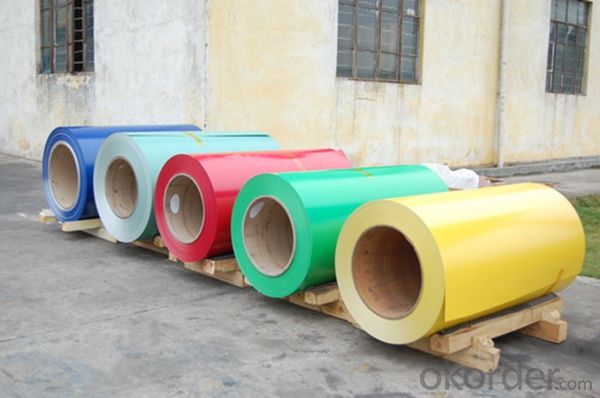
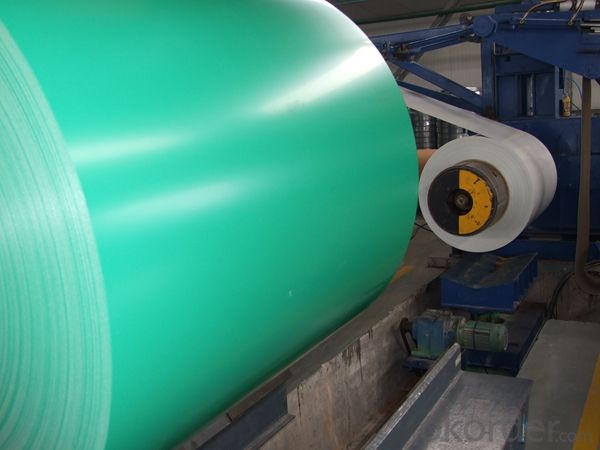
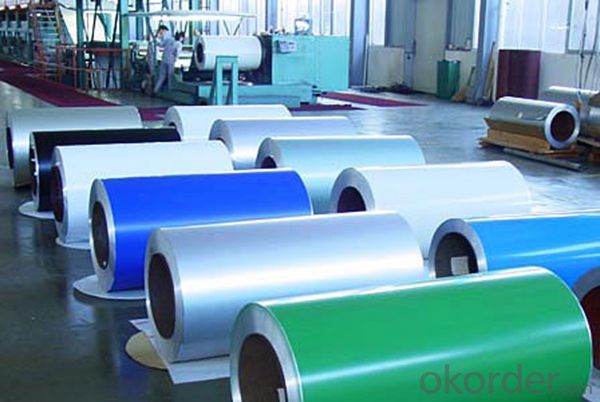
6. Package and shipping of Color Coating Aluminum Coil for Building
eye to wall
eye to the wall
with wood pallet (wooded case also available)
7. FAQ
1) What is the delivery time?
Dpends on actual order, around 20 to 35 days
2)What is the QC system:
We have QC staff of 20 persons and advanced equipment, each production is with MTC traced from Aluminum ingot lot.
3) What market do you mainly sell to?
Australia, America, Asia, Middle East, Western Europe, Africa etc
- Q: Are aluminum coils suitable for architectural facades?
- Yes, aluminum coils are suitable for architectural facades. Aluminum is a popular choice for architectural facades due to its numerous advantages. Firstly, aluminum is lightweight, which makes it easier to handle and install compared to other materials. This is especially beneficial for high-rise buildings or complex architectural designs. Secondly, aluminum is highly durable and corrosion-resistant. It is naturally resistant to rust and does not require any additional coatings or treatments. This makes aluminum coils suitable for long-term use in various weather conditions, including harsh climates or coastal areas where corrosion is a concern. Furthermore, aluminum coils offer versatility in terms of design and customization. They can be easily formed into different shapes, sizes, and profiles, allowing architects and designers to create unique facades that meet their specific requirements. Aluminum can also be painted or coated in different colors and finishes to achieve the desired aesthetic appeal. In addition to its functional and aesthetic advantages, aluminum is also an environmentally friendly choice. It is a recyclable material, meaning that it can be reused indefinitely without losing its properties. This makes aluminum coils a sustainable option for architectural facades, aligning with the growing focus on green building practices. Overall, aluminum coils are a suitable choice for architectural facades due to their lightweight nature, durability, versatility, and sustainability. They offer a wide range of design possibilities while ensuring long-term performance and low maintenance requirements.
- Q: I want to paint my cars rims and grill metallic pink. But supposedly paint doesn't stick well to aluminum. What can I do to make it stick better and not chip?
- The best way is to have the pieces powder coated. Its a little expensive but the color and luster are outstanding and will last forever.
- Q: How are aluminum coils coated or finished?
- Aluminum coils can be coated or finished in various ways to enhance their appearance, protect against corrosion, or improve their functionality. The most common methods of coating or finishing aluminum coils include painting, anodizing, and laminating. Painting is a popular coating method where a layer of paint is applied onto the aluminum surface. This can be done through different techniques such as spray painting, roll coating, or coil coating. The paint can be customized in terms of color, gloss level, and texture, allowing for a wide range of aesthetic options. Additionally, painting can provide protection against atmospheric conditions and increase the durability of the coils. Anodizing is another widely used technique, especially for architectural and industrial applications. It involves creating a controlled oxide layer on the surface of the aluminum through an electrochemical process. Anodized aluminum coils have a uniform and durable finish that enhances their resistance to corrosion, scratching, and fading. They are available in various colors and can be further enhanced with a matte, brushed, or polished appearance. Laminating is a process where a thin layer of protective film is applied onto the surface of the aluminum coil. This film can be made of different materials such as PVC, polyester, or polyethylene. Laminating provides an extra layer of protection against scratches, dirt, and UV radiation. It also allows for easy cleaning and maintenance of the coated aluminum coils. In addition to these methods, aluminum coils can also be coated with specialized finishes for specific applications. For example, coils used in the automotive industry may have a polymer-based coating that provides lubricity and reduces friction. Coils used in the construction industry may have a heat-reflective coating to improve energy efficiency. Overall, the coating or finishing of aluminum coils plays a crucial role in enhancing their appearance, protecting against corrosion, and improving their functionality for various applications. The choice of coating method depends on the desired outcome, budget, and specific requirements of the end-use industry.
- Q: What are the different forming processes for aluminum coils?
- Some of the different forming processes for aluminum coils include rolling, coiling, slitting, and annealing.
- Q: How are aluminum coils priced?
- Aluminum coils are typically priced based on various factors such as the current market price of aluminum, the size and thickness of the coil, the quantity ordered, and any additional customization or processing requirements. Additionally, factors like transportation costs and market demand can also influence the pricing of aluminum coils.
- Q: What are the various categories of aluminum coils based on their characteristics and applications?
- <p>Aluminum coils are categorized based on their thickness, alloy composition, surface treatment, and temper. The main types include: 1) Thickness-based: thin gauge, medium gauge, and thick gauge coils. 2) Alloy composition: 1000 series (99% aluminum), 3000 series (aluminum-manganese), 5000 series (aluminum-magnesium), 6000 series (aluminum-silico-magnesium), and 7000 series (aluminum-zinc). 3) Surface treatment: mill finish, anodized, painted, and coated. 4) Temper: O (annealed), H (strain hardened), W (solution heat treated), and T (thermally treated to various strengths). Each type serves specific industries such as construction, automotive, packaging, and aerospace.</p>
- Q: Why does fillet appear when rolling aluminum coil?
- How thick and wide is it when there is such problem? Which is the rolling pass? And what is the type of the rolling mill? The simple 4 rollers or CVC and HC rolling mill with roller control. Does the filler appear in rolling or out of roller? Different thickness will lead to different analysis.
- Q: Why does the end face of aluminum coil have grease spots?
- Process one without coolant to see whether there are spots. There is a layer of alumina membrane on the blank face of aluminum coil, which will react with basic coolant when heating through processing.
- Q: Can aluminum coils be used for electrical applications?
- Aluminum coils can indeed be utilized for electrical purposes. The electrical industry extensively employs aluminum due to its superb conductivity, lightweight nature, and resistance to corrosion. Various electrical applications, such as transformers, motors, generators, and inductors and solenoids, commonly employ aluminum coils. These coils possess advantages like high thermal conductivity and minimal eddy current losses, which make them highly efficient in the transmission and distribution of electrical power. Moreover, aluminum coils are more cost-effective when compared to copper coils, making them the preferred choice for numerous electrical applications. Nevertheless, it is worth noting that aluminum possesses lower electrical conductivity than copper. Therefore, adjustments in the coil design and dimensions may be necessary to ensure optimal performance.
- Q: Are aluminum coils suitable for food and beverage packaging?
- Yes, aluminum coils are suitable for food and beverage packaging. Aluminum is a versatile material that offers various advantages for packaging applications. It is lightweight, making it easy to transport and handle. Aluminum is also highly resistant to corrosion, which ensures that the packaging remains intact and protects the contents from external factors. Additionally, aluminum has excellent thermal conductivity, allowing for efficient heat transfer, which is beneficial for food and beverage products that require temperature control. It is also impermeable to light, moisture, and oxygen, providing an excellent barrier to maintain the quality and freshness of the packaged items. Furthermore, aluminum is recyclable and can be reused, making it an environmentally friendly choice for packaging. Overall, aluminum coils are a reliable and suitable option for food and beverage packaging due to their durability, protective properties, and sustainability.
Send your message to us
2x.040 Aluminum Coil Stock for Color Coating Aluminum Coil for Building
- Loading Port:
- Shanghai
- Payment Terms:
- TT OR LC
- Min Order Qty:
- 5 m.t.
- Supply Capability:
- 10000 m.t./month
OKorder Service Pledge
OKorder Financial Service
Similar products
Hot products
Hot Searches
Related keywords
